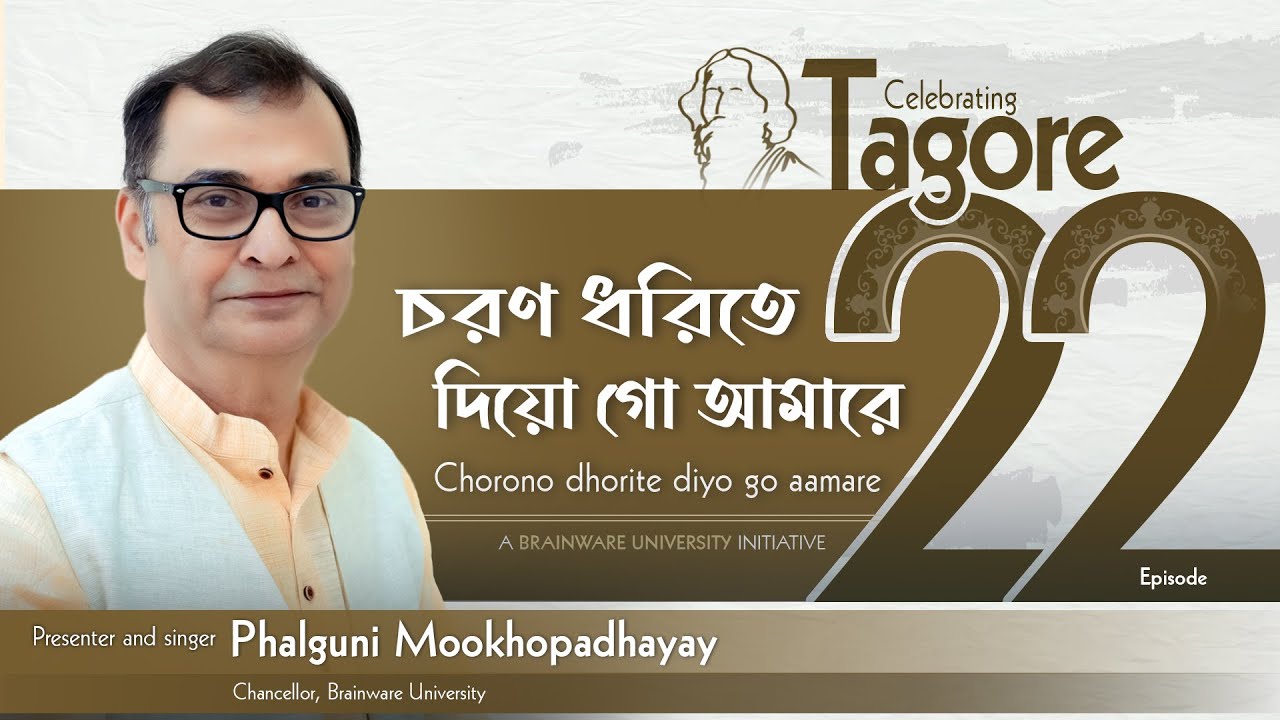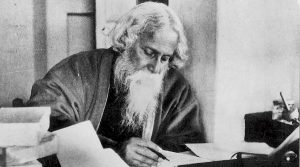
This song is from the ‘Parisodh’ song-drama sequence, in the second scene of the dance-drama Shyama. Towards the end of August 1936, Pratima Devi, Rabindranath Tagore’s daughter-in-law, was preparing to stage a performance of the poem ‘Parisodh’ from the book Katha o Kahini, titled Samanya Khati. Tagore started composing the first song on August 31, as per Pratima Devi’s plan. But, in the end, Gurudev adapted the story to his own style and composed one song after another. Everyone started the work of choreographing all those songs. Finally, it was decided that ‘Parisodh’ will be performed on October 10 and 11 at the Ashutosh College theatre. Author Pravat Kumar Mukhopadhyay assumes in his book Gitabitan Kalanukramik Suchi, that Rabindranath composed the song Chorono Dhorite Diyo Go keeping in mind the date of his father Maharshi Debendranath Tagore’s birth anniversary on May 15 in 1914. Later Tagore sang this song himself, on January 31, 1915, in Maghotsav.
Lyrics:
চরণ ধরিতে দিয়ো গো আমারে—
নিয়ো না, নিয়ো না সরায়ে।
জীবন মরণ সুখ দুখ দিয়ে
বক্ষে ধরিব জড়ায়ে।
স্খলিত শিথিল কামনার ভার
বহিয়া বহিয়া ফিরি কত আর—
নিজ হাতে তুমি গেঁথে নিয়ো হার,
ফেলো না আমারে জড়ায়ে।
বিকায়ে বিকায়ে দীন আপনারে
পারি না ফিরিতে দুয়ারে দুয়ারে—
তোমার করিয়া নিয়ো গো আমারে
বরণের মালা পরায়ে।।
English translation:
Allow me to touch your feet, please do not move them away,
With the joys and sorrows of life and death, I will hold them to my bosom,
How long can I carry the burden of my desires that are in disarray?
With your own hands, string them into a garland, do not scatter me away.
Quench the ever-thirsty pain of yearning and revive them instead.
Let them emerge victorious in the final battle, losing only to you.
By selling myself, I cannot wander from door to door anymore,
Make me yours please, by welcoming me with the garland.
Some useful information
Written on: May 17, 1914, at Ramgarh
Age of the poet: 53
Published in: Gitimalya (1937)
Parjaay (Category): Puja (Worship)
Upa-parjaay (Sub-category): Prarthana (Prayer)
Taal: Ardha-Jhap Taal
Raga: Bhairavi
Notation: Gitimalya
Swarabitan: Vol. 40
Notation by: Dinendranath Tagore
Purpose of the presentation
Tagore’s music resonates with people from all walks of life. His songs are performed at cultural events, religious ceremonies and social gatherings, reflecting their enduring popularity. In an effort to bring home this treasure trove to the non-Bengali population and Bengalis around the globe, Brainware University offers a selection of Rabindrasangeet in this presentation. It is enriched with details on the songs and relevant anecdotes.
Sung By
Sri Phalguni Mookhopadhayay Chancellor, Brainware University
Phalguni Mookhopadhayay is the founder-Chancellor of Brainware University, founder-Chairman and Managing-Director of Brainware Consultancy Private Limited and founder-Chairman of Webguru Infosystems Private Limited. He did his schooling at Ramakrishna Mission Vidyalaya, Narendrapur, and graduated with honours in Economics from St Xavier’s College, Kolkata. He completed his masters in Economics from Calcutta University and MBA from IISWBM, before joining Hindustan Lever as a management trainee. He worked as a market planner for the ABP group for nearly a decade before striking out on his own and successfully launching two private limited companies and one University. Phalguni Mookhopadhayay is a self-taught digital artist, a versatile photographer, a filmmaker and a weekend singer who has already recorded 78 songs and is now immersed in a project to popularise Tagore songs among a global audience.





